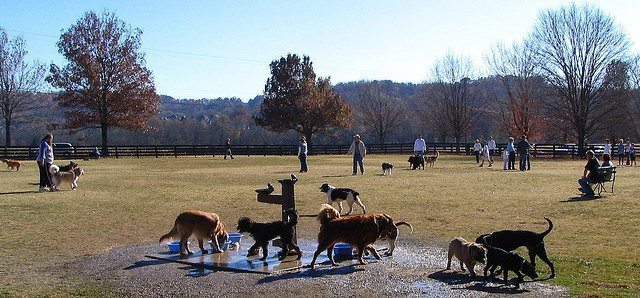For pet parents, the dog park is a special place that provides benefits to both dog and his parent.
Dogs of all ages need exercise. Like humans, exercise helps keep them healthy and strong. An older dog may play less, but will enjoy it just as much as the puppies. You may want to bring a ball or rope toy to inspire your dog. A great device that allows you to throw a ball a long way, and protect your arm and shoulder, is a ball launcher, which can be found at most pet supply stores. If you don’t bring a toy, there are usually sticks laying around. Your dog won’t know the difference. He will enjoy fetching just about anything you throw.
a ball or rope toy to inspire your dog. A great device that allows you to throw a ball a long way, and protect your arm and shoulder, is a ball launcher, which can be found at most pet supply stores. If you don’t bring a toy, there are usually sticks laying around. Your dog won’t know the difference. He will enjoy fetching just about anything you throw.
Perks for the owner include meeting new people, sitting out in the sun and fresh air, and watching the dogs play. A blue mood can be lifted as it is difficult to be sad in the presence of dogs playing.
A risk for pet parents is the potential to be knocked down by a running dog, and since dogs are off leash, there is also risk of fights. It is unusual that serious injury occurs, but it can happen. Responsible pet parents should keep their dog in sight at all times, and intervene if they become aggressive. Keep your dog leashed entering and exiting the park, and once inside, have the leash easily available if it is needed. Do not keep your dog leashed while in the park, as they can feel threatened by the off leash dogs.
A good dog park has rules, many of them based on basic principles of etiquette. The following are typical rules at dog parks:
• Dogs must be up to date on all vaccines. Make sure you have license and rabies tags on their collar. But ensure you remove any collars that are made of metal, like choke or pinch collars. This will prevent teeth from being snagged or broken during mouth play.
• Females in heat are not allowed.
• If entering dog park with double gates, remove the leash before entering the second the gate. Dogs tend to feel vulnerable if constrained with a leash, and other excited dogs who may just be coming to greet you may cause fear in your dog, which could result in aggression.
• Puppies should be a minimum of four months old. Puppies under this age have not fully developed their immune system and could be susceptible to illness.
• If you and your dog are already in the park, be considerate of new arrivals. You should call or whistle for your dog to come to you when a new dog arrives. Particularly if a gate is between two dogs, causing a barrier which could result in territorial behavior and aggression.
• Owners must clean up after their dog. It is vital to keep the area clean for obvious reasons.
• Aggressive dogs are not allowed. Keeping aggressive dogs out of the dog park will reduce the risk of fights and injuries. If you see an aggressive dog in the park or if your dog becomes aggressive, your best option may be to leave.
• Holes made by dogs must be filled in by owners. Humans can break an ankle tripping in a hole.
• Do not bring food into the park. A dogs sense of smell is acute. Bringing “people” food into the park will result in dogs following the scent and begging. Small training treats are permitted.
• Pet parents are ultimately responsible for their pets. Stay with your dog at all times.
Following the rules helps ensure that you and your dog will be safe, will have a great experience, and will return often.
Photo: Courtesy of SeeMidTN.com (aka Brent) via Flickr (CC by 2.0)









